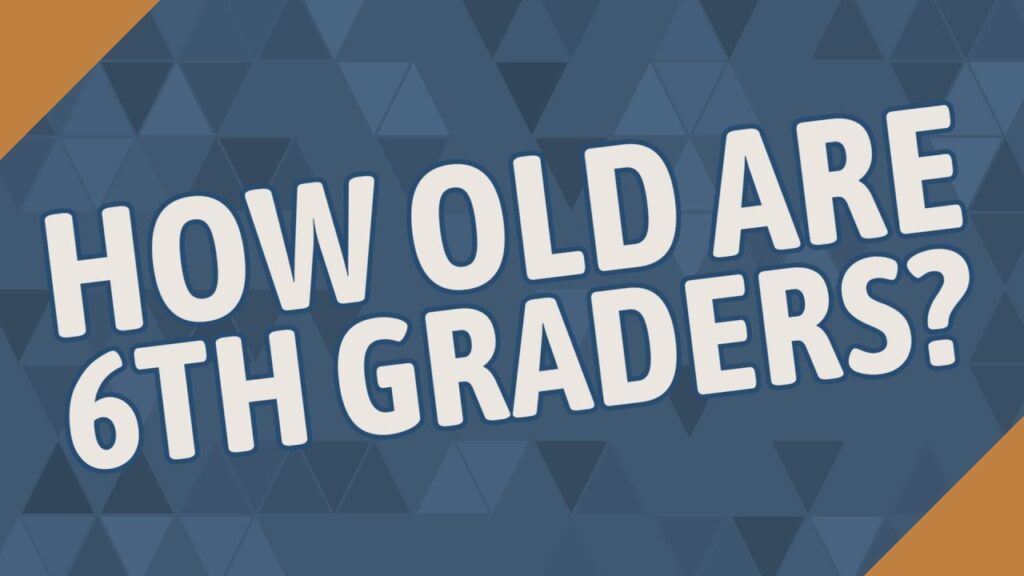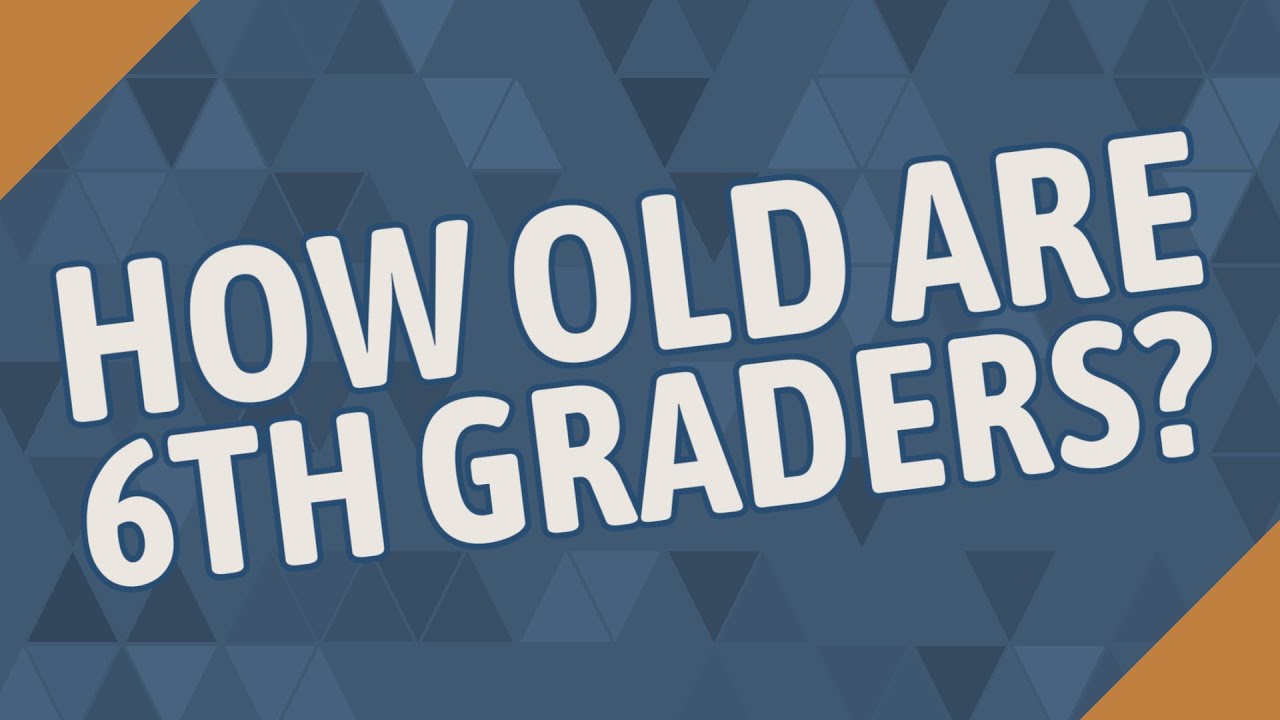
How Old Was I in 6th Grade? Understanding the Age Range
Navigating the educational landscape can sometimes feel like a complex puzzle, especially when trying to pinpoint specific details like, “How old was I in 6th grade?” This question often arises from nostalgia, academic planning, or simply curiosity. The answer isn’t always straightforward, as several factors can influence a student’s age when they enter sixth grade. Let’s delve into the typical age range and the variables that can affect it.
Typical Age for 6th Graders
Generally, students are 11 or 12 years old when they are in 6th grade. This is based on the assumption that children start kindergarten around the age of 5 or 6 and progress through each grade without skipping or repeating. However, this is just an average, and the actual age can vary.
To understand this better, consider the common school progression:
- Kindergarten: 5-6 years old
- 1st Grade: 6-7 years old
- 2nd Grade: 7-8 years old
- 3rd Grade: 8-9 years old
- 4th Grade: 9-10 years old
- 5th Grade: 10-11 years old
- 6th Grade: 11-12 years old
Therefore, if a child starts kindergarten at age 5 and proceeds without interruption, they would typically be 11 years old at the start of 6th grade and turn 12 during the school year. If they started kindergarten at age 6, they would likely be 12 years old at the start of 6th grade.
Factors Influencing a Student’s Age in 6th Grade
Several factors can influence a student’s age in 6th grade. These include:
School Start Age
The age at which a child begins kindergarten is a primary determinant. Some parents choose to start their children earlier or later based on developmental readiness, local regulations, or personal preference. This decision alone can shift the age range in 6th grade by a year.
Birthdate
A student’s birthdate relative to the school district’s cut-off date is crucial. School districts typically have a date, often in the late summer or early fall, that determines whether a child can start kindergarten in a given year. For instance, if a child’s birthday is on September 2nd and the cut-off date is September 1st, they would have to wait another year to start kindergarten, making them older than their peers as they progress through school. Understanding how birthdates affect grade placement is key when asking, “How old was I in 6th grade?”
Grade Repetition or Skipping
Repeating a grade can make a student older than their classmates, while skipping a grade can make them younger. These decisions are usually made based on academic performance, social-emotional readiness, and teacher recommendations. If a student had to repeat a grade earlier in their academic career, they would likely be older when they reach 6th grade. Conversely, a student who skipped a grade might be younger than the typical 11 or 12 years old. [See also: Grade Skipping: Benefits and Drawbacks]
Early Entrance Programs
Some school districts offer early entrance programs for children who demonstrate exceptional readiness for kindergarten or first grade before the typical age. These programs allow academically advanced children to start school a year earlier, potentially making them younger when they reach 6th grade.
Special Education Considerations
Students with special needs may sometimes follow a different timeline in their education. They may start school later, repeat grades, or participate in alternative educational programs that affect their grade progression. This can result in a wider age range within a 6th-grade classroom.
Geographical Differences
School start age policies can vary by state or even by school district. Some regions may have stricter age requirements than others, influencing when children begin their formal education. Therefore, the answer to “How old was I in 6th grade?” could depend on where you attended school.
Calculating Your Age in 6th Grade
To determine your specific age in 6th grade, consider the following steps:
- Determine your birthdate: This is the starting point.
- Identify when you started kindergarten: Recall the year you began kindergarten and your age at that time.
- Factor in any grade repetitions or skips: Account for any instances where you repeated or skipped a grade.
- Calculate your age in 6th grade: Add the years of schooling to your starting age.
For example, if you were born on July 15, 2000, and started kindergarten in the fall of 2005 at age 5, you would have been in 6th grade during the 2011-2012 school year. By September 2011 (the start of the school year), you would have been 11 years old. You would have turned 12 in July 2012, while still in 6th grade.
Why Does Knowing Your Age in 6th Grade Matter?
While it might seem like a trivial question, knowing your age in 6th grade can be relevant for several reasons:
- Nostalgia and Reflection: It can trigger memories and reflections on your middle school experience.
- Academic Planning: For parents and educators, understanding the age range helps in planning age-appropriate curriculum and activities.
- Social-Emotional Development: Recognizing where a child falls within the age range can inform strategies to support their social and emotional growth.
- Historical Context: It can provide a reference point when comparing educational experiences across different generations.
Common Misconceptions About Age and Grade Level
There are several misconceptions about the relationship between age and grade level. One common misconception is that all students of the same age should be in the same grade. As discussed, various factors can lead to age variations within a grade. Another misconception is that being older or younger in a grade automatically indicates higher or lower intelligence. Age is just one factor among many that contribute to a student’s academic performance and overall development.
The Broader Impact of Age in Education
The age at which students enter and progress through school can have broader implications for their educational journey and future opportunities. Research suggests that students who are relatively older in their grade may have some initial advantages, such as greater maturity and readiness for learning. However, these advantages tend to diminish over time, and other factors, such as motivation, support systems, and access to resources, become more influential. Understanding “How old was I in 6th grade?” provides a small piece of the larger puzzle of educational development.
Conclusion
So, how old was I in 6th grade? The most likely answer is 11 or 12 years old. Determining the exact age requires considering various factors, including school start age, birthdate, grade repetition or skipping, and geographical differences. While the question might seem simple, it highlights the complexities of educational timelines and the individual experiences that shape each student’s journey. Whether driven by nostalgia, academic curiosity, or a desire to understand your educational past, figuring out your age in 6th grade offers a unique perspective on your personal history. Remembering these details can also bring back memories and help contextualize your growth and development during those formative years. Don’t hesitate to look back and appreciate how far you’ve come since asking, “How old was I in 6th grade?”.

